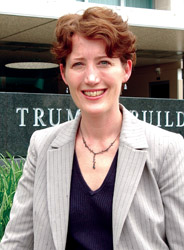|

A
World of Languages | Behind
the Scenes at the Winter Olympics | International
Programs Advisory Council | Making
a World of Difference in Asia | Leonard
Leads Changes in International Student Services
| GW-Oxford Program
Targets Human Rights | Have
Experience, Will Travel | GW
Women in the Middle East | Taking
Flight in Taiwan | Med
Students Ship Textbooks to Africa | Murrow
Honored in England | Student
Journal Celebrates 15 Years | World-Class
Performances at Lisner Auditorium | The
World is a Stage | Faculty
Focus | A Faculty
for Writing

Faculty Focus
An Interesting State of Affairs

|

Kristin Lord, associate dean at GW’s
Elliott School of International Affairs,
is on sabbatical and is serving the Department
of State after being awarded the Council
on Foreign Relations International Affairs
Fellowship.
Julie Woodford
|
During the past year, Kristin Lord, associate
dean at GW’s Elliott School of International
Affairs, has taken a sabbatical and is serving
the Department of State after being awarded the
prestigious Council on Foreign Relations International
Affairs Fellowship. This fellowship gives her
the opportunity to work as special adviser to
Paula J. Dobriansky, the under-secretary of state
for democracy and global affairs. Dobriansky’s
office coordinates U.S. foreign relations on a
variety of global issues, including democracy,
human rights, and labor; environment, oceans,
and science; population, refugees, and migration;
women’s issues; and human trafficking.
Lord earned the fellowship through a competitive
national application process. She’s in good
company—previous fellowship recipients include
Secretary of State Condoleezza Rice, U.S. Ambassador
to Iraq Zalmay Khalilzad, and GW faculty members
Henry Nau, professor of political science and
international affairs; Gordon Adams, professor
of the practice of international affairs; Jim
Goldgeier, professor of political science; Amy
Searight, Gaston Sigur Memorial assistant professor
of political science and international affairs;
and Hope Harrison, associate professor of history
and international affairs.
Lord works on a wide range of interests including
international science and technology, international
health issues such as avian flu and polio, rule
of law, and public diplomacy. She provides advice
and develops strategies for the under secretary,
coordinates projects in her portfolio, accompanies
her on international trips, and writes papers,
articles, and speeches. Most of Lord’s work
has focused on the Middle East and Africa.
“International science and technology
cooperation builds bridges between the United
States and foreign societies,” Lord says.
“American scientific achievements, innovation,
and technologies are among the most respected
elements of our society and provide an excellent
foundation for positive engagement with predominantly
Muslim countries.”
Trips to Egypt and Algeria culminated in the
signing of a science and technology agreement
with Egypt, and she traveled to Libya to promote
scientific engagement with the United States between
the two countries and to integrate Libya into
the international community. “It has been
a privilege to advance important projects like
the Iraqi Virtual Science Library, initiatives
that empower women scientists and engineers, and
programs that help young people apply their scientific
knowledge to the commercial marketplace,”
Lord remarks.
“I will be able to bring a wealth of knowledge
and experience back to GW,” Lord says when
asked how her sabbatical will benefit GW students.
“And personally, I have a much greater sense
of how foreign policy is made and implemented—and
the constraints our foreign policy makers face.
It’s a fascinating process, and it is very
rewarding to be a part of it.”
Illustrating the strong bond between GW and
the State Department, she says she regularly meets
people at the State Department who are GW alumni,
students, former or current professors, or parents
of students.
“Our strong, multidisciplinary international
affairs curriculum must prepare students well
for careers in diplomacy,” Lord notes. “GW
alumni excel at the State Department.
“GW’s location and strong ties to
the policy community give students insights about
how the government works. Even as students, they
have a much better feeling for how policy is made
than students who don’t study in Washington.
Our students have so many opportunities to interact
with foreign policy makers, and this gives them
a leg up as they enter the job market.”
Lord also is looking forward to the release
of her book, Perils and Promise of Global
Transparency: Why the Information Revolution May
Not Lead to Democracy, Security, or Peace
(SUNY Press, 2006), in October.
—Maureen Ryan
|